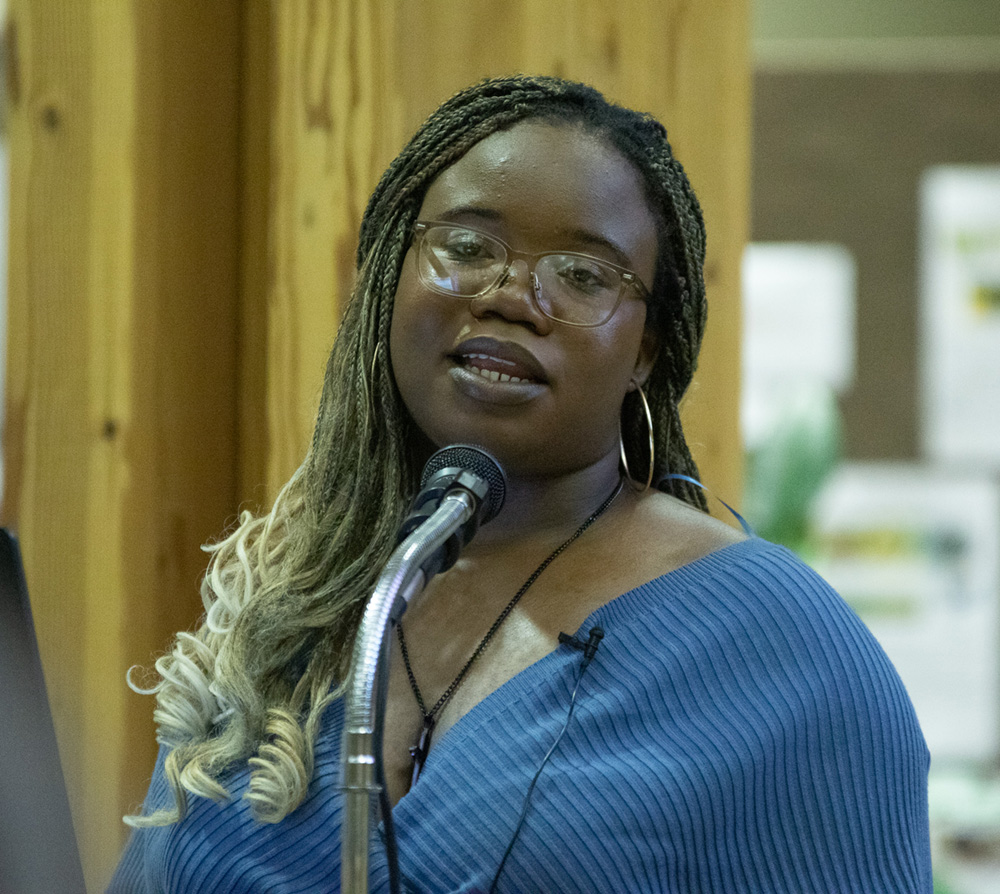Tchona presents Graves Lecture about preparing for graduate school

CHADRON – Chadron State College senior Emmanuella Tchona was the first student in recent history to speak during the Graves Lecture Series April 2. She will graduate in May with a bachelor’s degree in chemistry.
She has been an Institutional Development Award Program (IDeA) Networks of Biomedical Research Excellence (INBRE) scholar since 2022. INBRE is a project funded by the National Institute of Health intended to train young scientists in research. The two-year internship program includes academic research at CSC for two fall semesters and at the University of Nebraska Medical Center (UNMC) for two summers.
Her Chemistry adviser is Dr. Mary Keithly and the INBRE coordinator at CSC is Dr. Ann Buchmann.
Tchona said moving about every four years during her school years, helped her learn new environments and become more fluent in English. She and her family moved from Benin to Senegal at age nine. She entered a bilingual school where she learned to read, write, and study her school subjects in English. Her next move was to Nigeria for high school. Since the official language was English, she felt living in Nigeria helped accelerate her ability to communicate in English.
“Exposure to multiple cultures helped me learn that there are different ways to do things,” she said.
Tchona explained the timeline for applying to graduate school and suggested that interested students start two years in advance. She also shared advice about the value of being involved in extracurricular events and keeping a core in a major to advance toward graduating on time, which she was able to do even though she added and dropped a variety of minors.
She described living in Chadron as a haven and a forge.
“A haven during the pandemic. We were served three meals a day in the residence halls. That’s important. Being so far from home was a trial so it has made me develop strength and resilience,” she said.
She acknowledged her mentors at UNMC and CSC.
“CSC graduate Isioma Akwanamnye was an inspiration to me. She encouraged me,” Tchona said.
When Tchona enrolled at CSC, she was interested in medicine or science research. Initially, she was worried about breaking things in a lab but found when she did break a couple of things in the UNMC lab, it wasn’t terrible.
“INBRE was great for me because I was always interested in research, but I also have very diverse fields of interest and they allowed me to explore those. My first summer I worked in an organic chemistry lab and did chemical synthesis,” she said.
Later, she researched pancreatic cancer, breast cancer, and a parasitic worm disease that affects two billion people in South America, Asia, and Africa each year. Schistosomiasis is considered a neglected tropical disease. She presented her work on it at the INBRE Conference in August.
“The only treatment effective against the disease so far is called Praziquantel. But the worms will eventually become resistant to it. Steady but small signs of resistance are already popping up,” she said. “I love research. It’s fun. It’s complicated and takes a long time to see results.”
On April 19, she will make her final presentation at the Nebraska Academy of Sciences in Lincoln.
In addition to pursuing her chemistry degree, Tchona was required to do a three-semester-long research project. She decided to study how Methicillin-Resistance Staphylococcus Aureus (MRSA) inactivates the antibiotic Fosfomycin. MRSA is one of the bacteria that causes most of the infections patients get in a hospital.
“This is important work. Antibiotic-resistant infections are a serious problem. We have a war going on against disease and we are not prepared for it. We went through a time when antibiotics were thrown at everything. The indiscriminate use of antibiotics put pressure on the bacteria forcing it to adapt,” Tchona said.
This fall, she will enroll in a doctoral program at the Medical College of Wisconsin in Milwaukee.
Tchona explained various options after earning a doctorate including postdoctoral research, research scientist in a lab, work in a government lab, industry research and development, teaching at a college or university, market research analysis, consulting, or entrepreneurial ventures.
"The sky is just the beginning. I hope to go back to West Africa to develop the research sector and develop cures for tropical diseases in the region," she said.
Category: Campus News, Graves Lecture Series
